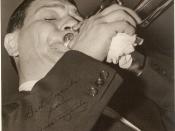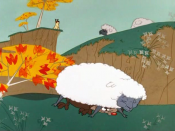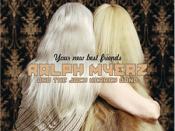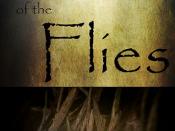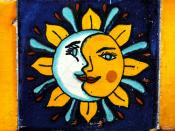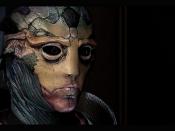The Lord of the Flies, by William Golding explores the abuse of power and the manner in which abusive power corrupts both the individual who has it and the people who live under it. Through his depiction of a group of schoolboys stranded on an island, and the lust for chief, physical decay, and barbaric killing spree of their acquired leader, Jack, Golding shows the disintegration of a society controlled by force, might, fear and power lust. Through the characters, Jack, a young boy who eventually makes himself leader through intimidation and force, and Roger, the boy who becomes Jack's "right hand man"ÃÂ, and eventually an assassin, Golding exhibits the lure of power and its destructive force on the human spirit. Power so destructive that it can turn men to "beasts"ÃÂ.
Society holds everyone together with ideals and values, rules of behavior and order based on laws, without which there is chaos.
In a situation without these conditions, there is a need for control and leadership. Golding demonstrates this when the group of English schoolboys find themselves without adult supervision after their plane crashes on a deserted island. Two boys, Jack and Ralph are the choices for leader, but when Ralph wins an election, Jack becomes angry, for he wants the power whereas Ralph was reluctant to have it. Jack likes to have control over the other boys, this is seen when Jack first appears leading and calling out orders to a group of choirboys. He makes them wear their caps and heavy, black choir robes, march in a straight line to his command, and stop only when he tells them to stop. When Ralph agrees to share the power with Jack, Jack, who is convinced that, "I ought to be chief"ÃÂ (22), quickly agrees only if he can have a group to lead himself; he calls them the hunters. This is the first step toward Jack's absolute power and the havoc it will cause to him as a person and to the entire group.
As the novel progresses, Jack who once claimed, "We'll hunt. I'm going to be chief"ÃÂ (127), becomes unsatisfied with sharing leadership and wants complete power. Slowly, Jack's quest to be the sole leader causes him to ignore the values and goals that held the boys together in a decent society. First, Jack and his hunters, led by Roger, hunt a pig for food. Though he tries to kill the pig, Jack cannot bring himself to "stick it"ÃÂ with his knife because he still had values and humanity. However, after being embarrassed by not killing the pig and bringing food as he arrogantly promised, Jack and his hunters find the pig and brutally stab it over and over again. Now, Jack feels he is superior to Ralph because he has killed and proven himself as powerful. He also feels that the boys must depend on him for food; this makes him feel even more important because without him, the boys cannot eat, therefore, survive. As Jack's destruction as a rational, moral person comes into view and we see him as a barbaric figure, we can see the physical decay and transformation of Jack into an animal. He paints his face and chest like a savage and orders his hunters to do the same. He places the pig's head on a stick, and he and the hunters, who are now his willing followers, begin to "worship"ÃÂ the head as if it were spirits, and they obey because he has given them direction and a sense of importance. His arrogance escalates as does his cruelty and animal like rule. He wants all the power now "ÃÂ he craves it. He wants it so much that he will go to any length to get it.
Jack's and Roger's complete transformation and the boys' total downfall come with the murder of Piggy, death of Simon, and attempt to kill Ralph. When Piggy protests Jack's ignoring of the rules, Jack humiliates Piggy by calling him names. The hunters follow Jack's example and eventually all the boys laugh while Ralph is powerless to help. Not long after that, while Piggy is talking, Roger pushes a boulder down onto Piggy, resulting in his death. Roger feels no remorse, and Jack praises Roger's cold-blooded action. At another time all the boys are dancing wildly on the beach when Simon comes rushing to tell them that a "monster"ÃÂ they feared was really a dead man with a parachute. The boys are in a crazed and trance-like state; Jack claims that Simon is the "beast"ÃÂ and orders the boys to attack and kill. Wildly, like insane animals, the boys brutally club Simon to death, then send his body out to sea. There is nothing of human morality left in them "ÃÂ only animalistic instincts to follow the leader of the pack, Jack, who has won the position by physical force and the fear of the beast that he has created. Later, Jack orders the boys to hunt Ralph whom they had once wanted as a leader. Jack wants Ralph out of his way and has convinced the boys that Ralph is bad for all of them "ÃÂ an enemy. They don't see that this is wrong; they don't realize that Jack is lying. Worse, they don't recognize what they have become and that this happened because they fell under a leader who became corrupt with power.
Through the slow process of Jack's taking power and the boys' eventual following, Golding proves that absolute power, especially when it goes unquestioned and unchallenged, corrupts all who are affected by it. He exhibits that it is not only the leader who is corrupted by this, but it is also the people who are corrupted because they accept and take part in the dictatorial cruelty. Primarily by Jack's lust for chief, physical decay, and barbaric killing spree, along with the fear of the choirboys that kept them loyal to Jack we can see how power corrupts. Such tyrants can come to power by preying on human weakness and succeed only in creating chaos in the land and destruction of the human spirit of those they rule.
